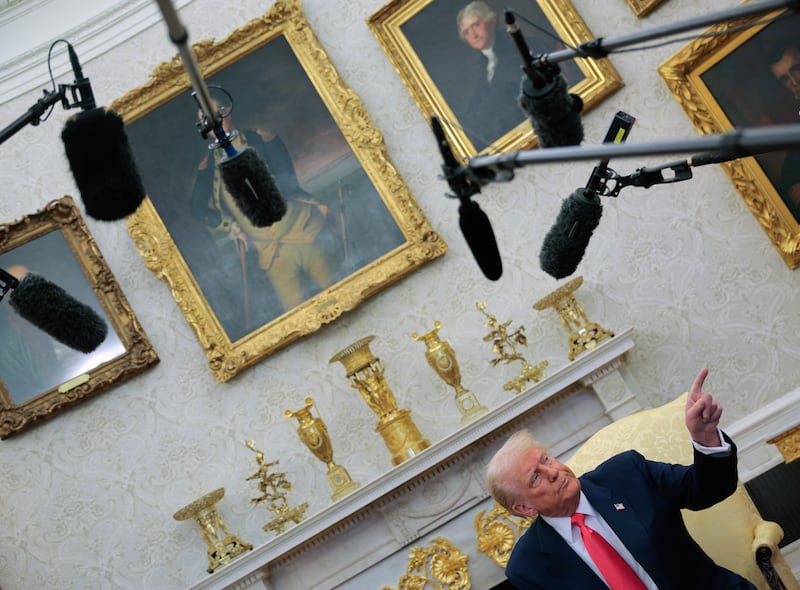The Trump administration’s flagrant attacks on press freedoms show no signs of stopping. It’s easy to brush off individual incidents: One more threatening social media post, one more lawsuit, they all start to feel like drops in the bucket. But President Trump‘s vilification of the press should be seen in the context of his larger agenda to discredit any arbiter of fact and fiction that has not kissed the ring.
The goal is to make Trump’s “alternative facts” the only facts. That’s why the administration is going after not only journalists but everyone from prestigious universities in Cambridge, Massachusetts to small medical journals in Glenview, Illinois.
Trump is also targeting institutions that lend prestige to noteworthy truthtellers, from the Smithsonian (and even the Holocaust Museum) to the Pulitzer Prize Board, which announced its latest winners Monday while defending Trump’s baseless lawsuit over its 2018 awards. That case threatens not only journalism itself but the ability of organizations not controlled by the White House to opine on what qualifies as true, integral and rigorous reporting.
Just look at Attorney General Pam Bondi‘s repeal of policies restricting prosecutors from forcing journalists to out their sources. Bondi claims that the changes are necessary because leaks to the media are undermining the administration’s agenda—but the articles she cites as examples instead expose lies underpinning key policies. In this view, inconvenient truths and malicious lies are equally troublesome. They must be met with equal force.

It’s telling also that the administration’s battles against free speech focus so squarely on subjective and easy-to-politicize standards, like whether speech serves the “public interest.” The administrations’ attacks against broadcasters that hold licenses from the Federal Communications Commission and nonprofits that receive tax exempt treatment from the Internal Revenue Service each seek to weaponize that standard in unprecedented ways.
Under the constitution, all truthful speech inherently serves the public interest, because the public benefits from being informed. But the current administration lacks that basic appreciation of our constitutional principles—as if his policies weren’t proof enough, Trump recently said on Meet the Press that he doesn’t know if he needs to uphold the Constitution. It views any divergence from its ideologies as fundamentally at odds with the public’s interest, which it sees as interchangeable with its own political interests. That goes for everything from environmental activism to accurate reporting on ICE raids and the case of Kilmar Abrego Garcia. None of it is about fact finding. It’s about controlling the narrative and discrediting anyone who questions it.
Journalists are far from perfect. Of course, some reporters have at times been unfair to Trump—by downplaying the Hunter Biden laptop story, for example. Reporters have been unfair to many other presidents too, though. And plenty more go too easy on him—the blatant selling of presidential access by Trump’s relatives and businesses would make daily headlines in any other administration.
But the media’s shortcomings are matters for the public to debate, not for vindictive billionaire presidents to litigate in court. People can—and often do—take their clicks and subscriptions elsewhere when they lose trust in any particular outlet. Trump has the world’s largest platform to air his grievances, and can do so without weaponizing the law against constitutionally protected speech.
Of course, then he’d have to use persuasion, not intimidation. And that doesn’t work when his arguments aren’t persuasive—a frequent problem for him.
It is an imperative that we fight complacency when it comes to Trump’s attacks on the media and the systems that validate its integrity. Let’s hope journalists can slow the slide into authoritarianism and receive the recognition they deserve in the process.
The post Opinion: What’s at Stake When Alternative Facts Become the Only Facts appeared first on The Daily Beast.




